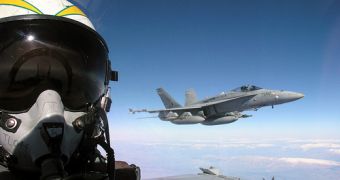A new study carried out by researchers from the University College London, concluded that the brains of fighter pilots are significantly different from those of normal individuals, with a similar IQ.
The scientists used cognitive tests and MRI scans to compare the cognitive performance of 11 front-line RAF (Royal Air Force) Tornado fighter pilots to a control group with no previous experience of piloting aircraft.
The participants had to complete two 'cognitive control' tasks with the purpose of assessing rapid decision making.
The tasks were designed to evaluate the influence that distracting information can have over the ability to update a response plan in the presence of conflicting visual information.
For the first one, the participants had to press a right or left arrow key, depending on the direction of an arrow on a screen in front of them, which was flanked by other distracting arrows pointing in different directions.
The results showed that the expert pilots were more accurate than the control group, even though the reaction same was very similar between the two groups.
In the second task, unless the participants were instructed to change their plan, they were supposed to respond as quickly as possible to a 'go' signal.
In this case, there was no difference between the two groups, so the authors concluded that the expertise in cognitive control could be highly specialized, very specific to certain tasks and not just linked to overall enhanced performance.
The scientists also used diffusion tensor imaging (DTI) – a type of MRI brain scan, to take a closer look at the structure of white matter connections between brain regions associated with cognitive control, and they found differences in the microstructure of white matter in the right hemisphere of the brain.
They discovered that fighter pilots have a superior cognitive control, with an impressive accuracy to one of the cognitive tasks, even if they proved to be more sensitive to irrelevant information too.
“We were interested in the pilots because they're often operating at the limits of human cognitive capability – they are an expert group making precision choices at high speed,” said senior author Professor Masud Husain, UCL Institute of Neurology and UCL Institute of Cognitive Neuroscience.
“Our findings show that optimal cognitive control may surprisingly be mediated by enhanced responses to both relevant and irrelevant stimuli, and that such control is accompanied by structural alterations in the brain.
“This has implications beyond simple distinctions between fighter pilots and the rest of us because it suggests expertise in certain aspects of cognition are associated with changes in the connections between brain areas.
“So, it's not just that the relevant areas of the brain are larger – but that the connections between key areas are different.
“Whether people are born with these differences or develop them is currently not known.”
This research was supported by funding from the Wellcome Trust, the Medical Research Council and the NIHR Specialist Biomedical Center at UCL/UCLH.
The study was published in the Journal of Neuroscience.

 14 DAY TRIAL //
14 DAY TRIAL //